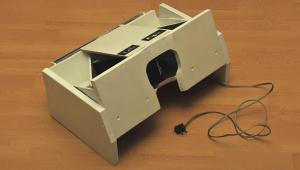Getting Edge; Inside Advice On Tech Support
Whenever you place a call to tech support—for any reason—take notes. Get names and of course dates and jot down a summary of all conversations. Nine times out of 10, when a customer complains about the behavior of a tech support agent, the conversation begins “I don’t know who I was talking to but…”
When you’re on hold and hear: “Your call is important to us. Please remain on the line for the next available agent,” over and over again, you have to be asking yourself why you’re on hold if your call is so freaking important to them, right?
Well, here’s news. Your call is important. The person you talk to may or may not convey that sentiment, but you must always keep it at the forefront. That’s an important element of getting “edge.” You are the customer, and while the customer is not always right, they are always the customer. Without customers we can all lock the door and go home.
A typical U.S.A.-based tech support specialist may handle 50 or more calls each day. That’s an average of better than six calls per hour, or one new “case” every 9.6 minutes—without breaks,
wrap-up time, or walking outside to scream at the top of their lungs to relieve the stress that comes from performing one of the most abused, lowest paid, and least recognized jobs in any sales organization.
Sophisticated call-routing software called ACD (for Automated Call Distribution) allows customers to sort themselves into the right queue by answering a few prompts. This utility enables call center management to evaluate employees based on many statistically measurable events, including how many calls they handle per day, average call length, and wrap-time between calls.
The more sophisticated versions can track the all-important “first call resolution” statistic—the number that substantiates that a caller was properly helped on his first call and did not have to call back within a short period of time for further explanation. ACDs can also track the dreaded “escalations”—those nasty calls that are fed up the food chain to a supervisor (or someone pretending to be a manager). ACD software calculates group performance and analyzes metrics like hold time, abandon threshold, and incoming call origin. And of more importance to you, this software can recognize your phone number and automatically retrieve your previous cases and case notes. Yes, it knows how many times you called and to whom you spoke.
What ACD software cannot evaluate is the congeniality of the support agent, the attitude they convey by the tone of their voice or the quality of the answers they provide. Those are obviously subjective. Nonetheless, those are the things consumers care about; customers don’t give a damn how many cases are processed by a call center.
Unless you are calling to inquire where a product can be purchased (so-called “presale service”), there are two reasons to contact tech support. If you’re calling with a technical question—even a complicated one—you don’t need any special strategy. Just use common sense, be polite and mind your manners. Just like your mom taught you, it never hurts to say “please” and “thank you.” But if you’re calling about a serious issue—a camera that is “DOA” right out of the box, for example—think and plan before you act.
Because any product you buy may eventually need service, you should always keep the box, all original packaging, documentation, software, plastic bags, stickers, warranty card and Owners Manual documents, and—most important of all—original sales receipt. This simple precaution can help you avoid tons of aggravation later on.
Before you call, know your rights. Residents of Maine, for instance, have a four-year warranty on electronic products, regardless what the card in the box says. This is all part of being prepared. Know the model number, serial number, and other pertinent information related to your camera. If you’re calling from work, have the camera at your side—or at least have everything written down so that you don’t turn a simple support call into a continuing saga.
Have realistic expectations based on what’s reasonable. Although it may not seem like it to the person who is on the receiving end of a malfunctioning product that’s just a few months out of warranty, 99.9 percent of all service departments do their utmost to act in a way that is fair to all concerned. However, if you bought the camera secondhand on an auction website, don’t expect to be treated like the original owner. That’s not fair to any of us.
Know what you want. I’ve mediated countless cases that reached stalemate because the consumer did not know what to ask for other than a refund or replacement. Think about it. If you buy a camera from a third-party retailer, even a big one, how does it make sense for the manufacturer to provide the refund? They didn’t sell you the camera. Know what you want and ask for it clearly. Decide your fallback position, too, but of course, keep that to yourself.
If you get a firm “no” you can appeal to the support agent’s sense of fairness by saying, “I realize that you may want to help me more than you’re permitted.” That depersonalizes their negative response and encourages them to suggest another avenue for you to pursue. I once got a brand-new refrigerator by writing a letter to Jack Welch, CEO of General Electric. True story—and I would never have written the letter except that a GE employee suggested it.
Whenever you place a call to tech support—for any reason—take notes. Get names and of course dates and jot down a summary of all conversations. Nine times out of 10, when a customer complains about the behavior of a tech support agent, the conversation begins “I don’t know who I was talking to but…” If you don’t know the name of the person you spoke to, what can you expect to happen? And on the positive side, when you get outstanding service from a rep, remember their name. Knowing the name and phone extension of the rep who delivers straight answers gives you edge the next time you need help.
Follow up with a compliment. A short, handwritten note is good because it can be tacked to the bulletin board. Tech support is high on stress and low on limelight, so thank-you
notes are highly prized. An e-mail is okay, but address it to the highest level boss you can identify and be sure to suggest that it be forwarded up the chain of command.
How Not To Get Great Tech Support
Here’s a short list of things you must never do. Most of them are common sense, but you’d be amazed how uncommon sense is.
Do not say: “Don’t you know who I am?” You are probably important to someone, but saying that will not help you get your problem solved. This goes right along with this one: never pretend to be a lawyer (that’s illegal in many states, by the way). And of course, don’t ever use offensive language. Saying four-letter words will get you an immediate disconnect from most call centers—and those that have Caller ID will add you to their special list.
Never scream, and if you do scream, never ever scream, “I want to talk to your supervisor.” That’s one of the worst insults you can launch.
And don’t forget that the people working in tech support are being paid to help you—and to protect their company—but most of all, they are people who want to be treated with respect, just like you do.
















































